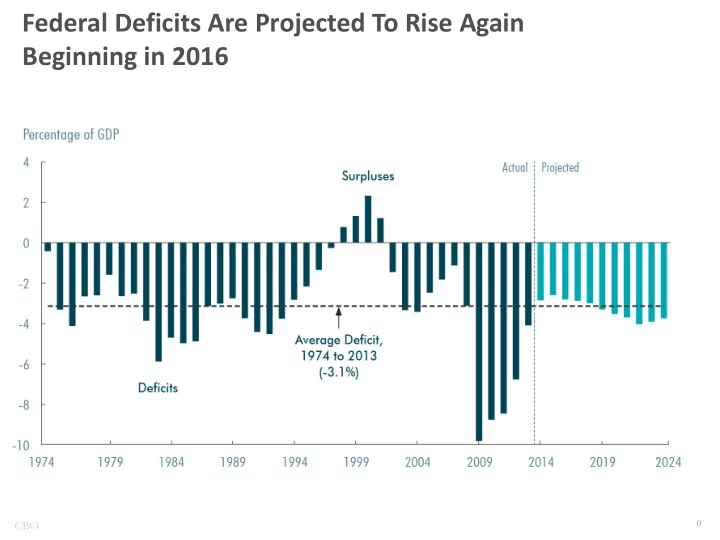

Federal Deficits Are Projected To Rise Again Beginning in 2016 CBO
Federal Debt Held by the Public Is Projected to Be at Historically High Levels CBO
Federal Spending and Revenues Are Both Projected to be Above Their 40-Year Averages CBO
For Most Income Groups, Average Federal Tax Rates in 2013 Were Well Below Their Averages for the 1979–2010 Period CBO
Federal Transfer Payments and Taxes Shift Resources to Elderly Households From Younger Households, On Average CBO
About 45 Percent of Federal Spending in 2013 Went for Social Security, Medicare, and Medicaid CBO
Under Current Law, Federal Spending for Health Care Is Growing Much Faster Than Other Spending and the Economy CBO
The Share of the Population Age 65 or Older Is Rising Substantially CBO
Growth in Health Care Spending Per Beneficiary in Excess of GDP Growth Has Varied a Lot So-called “excess cost growth,” or ECG, is the amount by which health care costs per beneficiary (adjusted for changes in the age profile of beneficiaries over time) outpace the maximum sustainable output of the economy per person. CBO
Under Current Law, Federal Spending for Each Major Health Care Program Will Grow Rapidly CBO
Even After the Affordable Care Act Is Fully Implemented, Most Federal Dollars for Health Care Will Support Care for Older People CBO’s projections for 2024: Exchange subsidies Medicare (net of offsetting receipts) Medicaid and CHIP and related items $858 Billion $582 Billion $137 Billion Federal spending in 2024 for the major health care programs will finance care for: Blind and Others People over age 65 disabled One-fifth Three-fifths One-fifth CBO
By 2023, Discretionary Spending Is Projected to Reach Its Lowest Percentage of GDP in Decades CBO
Federal Nondefense Investment Improves the Private Sector’s Ability to Invest, Produce, and Distribute Goods and Services CBO
If Investment Remains the Same Share of Nondefense Discretionary Spending as in the Past, It Is Projected to Reach Its Lowest Percentage of GDP in Decades CBO
Spending for Means-Tested Programs and Tax Credits for Low-Income People Rose Sharply in the Recession CBO
Recommend
More recommend